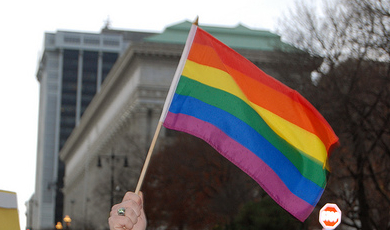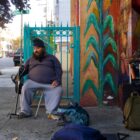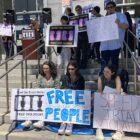This weekend’s Pride celebration will elevate the status of marriage-equality activists to a position of parity in the gay-rights movement with advocates from four decades ago when the San Francisco Lesbian, Gay, Bisexual, Transgender Pride Celebration Committee joins local veterans of the 1969 Stonewall protests to form a new parade contingent called “Stonewall 2.0.”
 |
|
|
The new contingency – comprised of five marriage-equality activist groups – will represent the “elders passing the torch on to the next generation,” said SF Pride committee executive director Lindsey Jones.
The marriage proponents “are activists, out on the streets like we were,” said Peter Fiske, San Franciscan and Stonewall veteran. “They are demanding full and equal civil rights. We are, in essence, the same group. When we see them we see ourselves.”
Sunday’s 39th annual Pride parade and festival will focus on marriage equality and also celebrate, to the day, the 40th anniversary of the Stonewall riots in New York’s Greenwich Village that began the gay liberation movement.
Stonewall veterans will have a place of honor behind Dykes on Bikes, who lead the parade. Behind them are expected hundreds of activists from the organizations Yes! On Equality; Meet in the Middle 4 Equality; One Struggle, One Fight; National March for Equality and Equal Rights Initiative.
“We are activists on the ground, we are not necessarily just fund raising or doing ballot initiatives,” said Ragina Johnson, an organizer with One Struggle, One Fight. She said the grassroots is “the way, ultimately, we are going to win.”
Johnson said the rallies and marches after Proposition 8 – which banned same-sex marriage in California – passed last November show how much anger there is and that people are willing to go out in the streets.
“Prop. 8 is our Stonewall," Johnson said. "It shows how much we’ve gained, but also how far we have to go.”
Brendan Behan, SF Pride deputy executive director, calls the organizations that make up Stonewall 2.0 “net-roots organizations.” The “Web 2.0” reference emphasizes the importance the groups have placed in information sharing and social networking.
Technology “allowed us to mobilize very quickly,” said Johnson, who added the large marches and rallies immediately following Proposition 8’s passage included lots of first-time activists brought in through Facebook and Twitter.
The placement of marriage advocates behind the Stonewall veterans is a visual representation in the parade of the LGBT community’s ongoing commitment to civil rights, Behan said. It shows the movement is “alive and well.”
“For us, Stonewall 2.0 really represents what youth activists have contributed to the movement,” Behan said.
Behan said the new groups don’t necessarily have the access or the funds to be in the parade as individual organizations and for many of their participants, this will be their first Pride parade. Combining the groups as one contingent gives them that opportunity.
Johnson said Pride will be an opportunity for networking and collaboration among the five organizations in the contingent.
“I bet a lot of those conversations will be happening as we march,” she said.
This is not the first time the San Francisco Pride celebration has been political. Other issues focused on in past celebrations include the Defense of Marriage Act, Don’t Ask Don’t Tell and HIV and AIDS.
“SF Pride is always really rooted in civil rights,” Behan said.
San Francisco’s Pride parade is on Sunday. It starts at 10:30 a.m. at Market and Beale streets and ends at Market and Eighth streets. A celebration from noon to 7 p.m. will follow at Civic Center. For more information and Pride-related events before and after Sunday, see sfpride.org.
Reach the reporter at bfleishman [AT] public-press.org.









